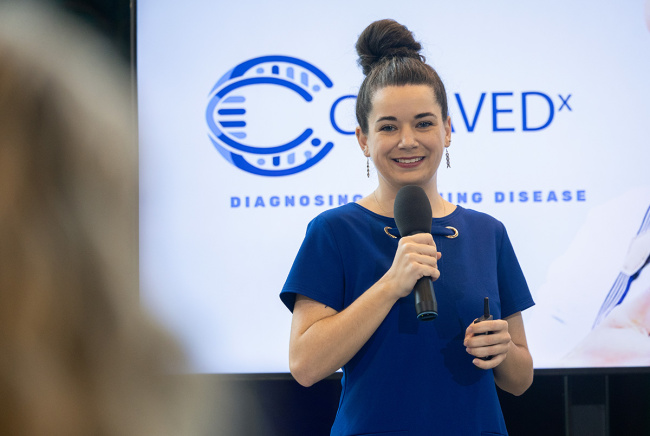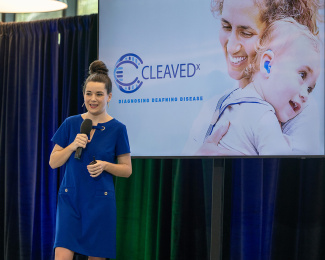In the early days of the pandemic, before at-home COVID-19 tests were available, Chandler Monk (M ’19, SSE ’25) worked for months in Tulane’s virology lab as a Bioinnovation PhD candidate, processing hundreds of samples, one by one. Not only was the work time-consuming, but it also strained the lab, which was handling as many as 600 samples a week and pushing researchers to their limits.
During those hours of testing, Monk realized if people had the ability to test for viruses with less manpower and equipment — not just for COVID-19 — it could “make all the difference.”
That insight inspired her to develop a new at-home test for an entirely different disease, congenital cytomegalovirus (CMV), the leading cause of non-genetic childhood hearing loss. CMV is widespread. In the U.S., nearly one in three children are infected by age five, and more than half of adults are infected by age 40.
Most people with the virus show no symptoms, but about 25% of infected babies later may develop serious health issues, including hearing loss, developmental delays, neurological impairments or vision problems.
To confirm congenital CMV — when the virus passes from mother to child during pregnancy — testing should occur within two to three weeks of birth. This early detection is crucial to intervene before irreversible damage occurs. Several states, including Louisiana, require newborn CMV screening, but hospitals can’t carry it out because of lack of resources.
Monk’s test uses three enzymes that boost each other’s sensitivity to detect tiny amounts of the virus. The reaction produces a bright green light signal using simple equipment such as a heat plate. If the sample glows, it’s a clear sign that CMV DNA is present.
But Monk’s scientific breakthrough alone wasn’t enough to make a difference. She needed a way to market and sell the test. So, she created Cleaved Diagnostics. Supported by a Tulane Provost’s Proof of Concept Fund (PPOC) grant and I-Corps, a National Science Foundation (NSF) program, Monk gained both entrepreneurial skills and critical early funding.
Between the Provost’s program, Tulane University Innovation Institute’s $50K Demo Day, and a Small Business Technology Transfer Phase I grant from the NSF, Cleaved has secured $380,000 in non-dilutive funding. The support, which doesn’t require her to give up equity in her company, will help validate her test on a larger scale in partnership with Minnesota’s state lab.
Over the next year, Monk’s team will analyze thousands of blood samples with the goal of improving CMV screening sensitivity from 73% to above 90%. “Every percentage point of sensitivity matters,” Monk said.
Mentors have taken note of her determination. Patent attorney Jacqueline Daspit connected with Monk through the Green Wave Innovation Network Mentor Program, which pairs Tulane students, faculty, researchers and community members with experienced professionals.
“I anticipate that Cleaved Diagnostics will be game changing in point-of-care diagnostics for parents and pediatricians,” Daspit said.
Monk said the strength of Tulane’s innovation ecosystem provided the support she needed to translate discovery into impact. “Ultimately, this is about making sure every baby has a fair start,” Monk says. “And that’s worth fighting for.”
































































